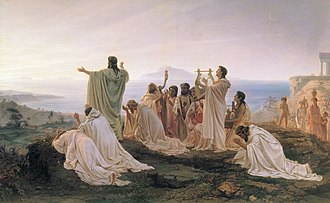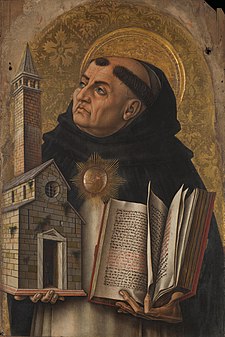Philosophy of religion
[3] Philosopher William L. Rowe characterized the philosophy of religion as: "the critical examination of basic religious beliefs and concepts.[1] The field also includes the ethical implications of religious commitments, the relation between faith, reason, experience and tradition, concepts of the miraculous, the sacred revelation, mysticism, power, and salvation.[9] Also, "theology is responsible to an authority that initiates its thinking, speaking, and witnessing ... [while] philosophy bases its arguments on the ground of timeless evidence.Perhaps most of the philosophy of religion is predicated on natural theology's assumption that the existence of God can be justified or warranted on rational grounds.For example, while the Taoist Xuanxue thinker Wang Bi argued that everything is "rooted" inWu (non-being, nothingness), Guo Xiang rejected Wu as the ultimate source of things, instead arguing that the ultimate nature of the Tao is "spontaneous self-production" (zi sheng) and "spontaneous self-transformation" (zi hua).[23] Traditionally, Jains and Buddhists did not rule out the existence of limited deities or divine beings, they only rejected the idea of a single all-powerful creator God or First cause posited by monotheists.More recent supporters of evidentialism include Antony Flew ("The Presumption of Atheism", 1972) and Michael Scriven (Primary philosophy, 1966).[39] The Protestant theologian Karl Barth (1886–1968) argued that religious believers have no need to prove their beliefs through reason and thus rejected the project of natural theology.[41] As Brian Davies points out, the problem with positions like Barth's is that they do not help us in deciding between inconsistent and competing revelations of the different religions.This field draws the historical study of their interactions and conflicts, such as the debates in the United States over the teaching of evolution and creationism.[43] There are different models of interaction that have been discussed in the philosophical literature, including:[43] The field also draws the scientific study of religion, particularly by psychologists and sociologists as well as cognitive scientists.[48] Other philosophers such as Eleonore Stump and Matthew Benton argue for an interpersonal epistemology on which one can experience and know God in a relational or personal sense.Indeed, a drunken or hallucinating person could still perceive things correctly, therefore these objections cannot be said to necessarily disprove all religious experiences.Explanations such as the fear of death, suggestion, infantile regression, sexual frustration, neurological anomalies ("it's all in the head") as well as the socio-political power that having such experiences might grant to a mystic have been put forward.The diversity (sometimes to the point of contradiction) of religious experiences has also been used as an argument against their veridical nature, and as evidence that they are a purely subjective psychological phenomenon.[59] In Western thought, religious experience (mainly a theistic one) has been described by the likes of Friedrich Schleiermacher, Rudolf Otto and William James.According to Walter Stace all cultures share mystical experiences of oneness with the external world, as well as introverted "Pure Conscious Events" which is empty of all concepts, thoughts, qualities, etc.Non-monotheistic Indian traditions like Buddhism and Advaita Vedanta find the highest Good in nirvana or moksha which leads to release from suffering and the rounds of rebirth and morality is a means to achieve this, while for monotheistic traditions, God is the source or ground of all morality and heaven in the highest human good.Another important topic which is widely discussed in Abrahamic monotheistic religious philosophy is the problem of human Free will and God's omniscience.God's omniscience could presumably include perfect knowledge of the future, leading to Theological determinism and thus possibly contradicting with human free will.[72] Rowe adds that "It remains true, however, that a reasonable person will require quite strong evidence before believing that a law of nature has been violated.This is often tied to belief in an immortal individual soul or self (Sanskrit: atman) separate from the body which survives death, as defended by Plato, Descartes, Monotheistic religions like Christianity and many Indian philosophers.[78] Bertrand Russell put forth the general scientific argument against the afterlife as follows: Persons are part of the everyday world with which science is concerned, and the conditions which determine their existence are discoverable...we know that the brain is not immortal, and that the organized energy of a living body becomes, as it were, demobilized at death and therefore not available for collective action.[82] Peter van Inwagen meanwhile, offers the following theory: Perhaps at the moment of each man's death, God removes his corpse and replaces it with a simulacrum which is what is burned or rots.This close connection between the two views was made by Kant, who argued that one can infer an afterlife from belief in a just God who rewards persons for their adherence to moral law.There are various philosophical positions regarding how one is to make sense of religious diversity, including exclusivism, inclusivism, pluralism, relativism, atheism or antireligion and agnosticism.Joseph Runzo., one of its most prominent defenders, has argued for henofideism which states that the truth of a religious worldview is relative to each community of adherents.[95] According to Runzo, this view does not reduce the incompatible ideas and experiences of different religions to mere interpretations of the Real and thus preserves their individual dignity.[109] The collapse of logical positivism renewed interest in philosophy of religion, prompting philosophers like William Alston, John Mackie, Alvin Plantinga, Robert Merrihew Adams, Richard Swinburne, and Antony Flew not only to introduce new problems, but to re-open classical topics such as the nature of miracles, theistic arguments, the problem of evil, the rationality of belief in God, concepts of the nature of God, and many more.[113] Using first-hand remarks (which would later be published in Philosophical Investigations, Culture and Value, and other works), philosophers such as Peter Winch and Norman Malcolm developed what has come to be known as contemplative philosophy, a Wittgensteinian school of thought rooted in the "Swansea tradition" and which includes Wittgensteinians such as Rush Rhees, Peter Winch and D. Z. Phillips, among others.







Religious philosophyTheologyReligiousAfterlifeApophatismCataphatismEschatologyEnlightenmentIntelligent designLiberationMiracleMysticismReincarnationReligious faithScripture (religious text)SpiritTheological vetoEthical egoismEuthyphro dilemmaLogical positivismReligious languageVerificationismeschatologicalProblem of evilTheodicyAugustinianIrenaeanBest of all possible worldsInconsistent triadNatural evilConceptionsAnthropopathismBrahmanDemiurgeDivinely simpleForm of the GoodHoly SpiritMaltheistOccasionalismPandeistPersonalProcess-theologicalSummum bonumSupreme BeingUnmoved moverExistenceBeautyChristologicalTrilemmaResurrectionConsciousnessCosmologicalkalāmDegreeDesireExperienceExistential choiceFine-tuned universeMathematicsMiraclesMoralityNatural lawNecessary existentSeddiqinNyayakusumanjaliOntologicalGödelAnselmMeinongianMulla SadraPascal's wagerProper basis / Reformed epistemologyReasonResponses to evilTeleologicalWatchmakerJunkyardTrademarkTranscendental747 gambitAtheist's wagerCreator of GodEvil GodFate of the unlearnedFree willGod of the gapsHitchens's razorIncompatible propertiesInconsistencyNonbeliefNoncognitivismOmnipotence paradoxPoor designRussell's teapotAbrahamicBaháʼíChristianityJudaismMormonismMandaeismBuddhismHinduismJainismSikhismTheories of religionAcosmismAgnosticismAnimismAntireligionAtheismCreationismDharmismDivine command theoryDualismEsotericismExclusivismExistentialismatheistChristianFeministFundamentalismGnosticismHenotheismHumanismsecularInclusivism